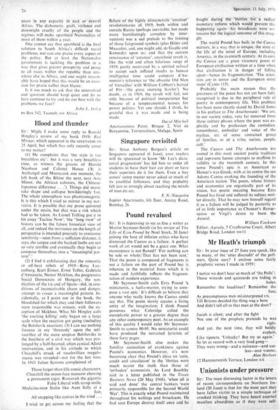Pound revalued
Sir : It is depressing to see as fine a writer as Martin Seymour-Smith (in his review of The Life of Ezra Pound by Noel Stock, 20 June) joining the host of inferior critics who have dismissed the Cantos as a failure. A perfect work of art would not be a great one. What masterpiece is not flawed? 'For nothing can be sole or whole/That has not been rent.' That the poem is composed of fragments is not a failure on the part of Pound but is inherent in the material from which it is made and faithfully reflects the fragmen- tation of modern experience.
Mr Seymour-Smith calls Ezra Pound 'a miniaturist, a haiku-master, trying to com- pose a vast epic.' It's difficult to believe that anyone who really knows the Cantos could say this. The poem slowly creates a living unity of the imagination; I think Pound possesses what Coleridge called the esemplastic power to a greater degree than any other contemporary poet. As an example of this quality I would refer Mr Seymour- Smith to cantos 90-95. No miniaturist could have produced the sustained lyricism of these forty pages.
Mr Seymour-Smith also makes the familiar accusation of crankiness against Pound's economics. However, it's now becoming clear that Pound's ideas on 'coin, credit and circulation' in the 'thirties were much nearer the truth than those of `orthodox' economists. As Lord Boothby said in a letter published in the Times Business News (20 May 1968), 'when all is said and done' the central bankers 'were primarily responsible for the Second World War'. This is exactly what Pound maintained throughout his writings and broadcasts. He had seen Europe destroy itself once and he fought during the 'thirties for a radical monetary reform which would prevent this happening again—his broadcasts were not treason but the logical outcome of this strug- gle.
The world Pound has built in the Cantos mirrors, in a way that is unique, the state of the life of the mind of Europe, including America, in the twentieth century. At its core the Cantos are a great visionary poem of European civilisation written at a time when that civilisation is in danger of falling apart—hence its fragmentation. 'The scien- tists are- in terror and the European mind stops' (Canto 115).
Probably the main reason that the greatness of the poem has not yet been fully recognised is due to the peripheral role of poetry in contemporary life. This problem has been most clearly stated by David Jones in his preface to The Anathetnata: 'We are, in our society today, very far removed from those culture phases where the poet was ex- plicitly and by profession the custodian, rememberer, embodier and voice of the mythus, etc of some contained group of families, or of a tribe, nation, people, cult.'
The Cantos and The Anathemata are rooted in this most ancient poetic tradition and represent heroic attempts to reaffirm its validity to the twentieth century. In this sense Pound's epic is as American as Homer's was Greek, with at its centre the ten Adams Cantos evoking •the founding of the American nation. The poem, whose history and economics are organically part of its vision, has poetic meaning because Ezra Pound has lived and suffered its subject mat- ter directly. That he may now himself regard it as a failure will be judged by posterity as of as little importance as Chaucer's Retrac- talon or Virgil's desire to burn the Aeneid.
William Cookson Editor, Agenda, 5 Cranbourne Court, Albert Bridge Road, London swl 1






























 Previous page
Previous page